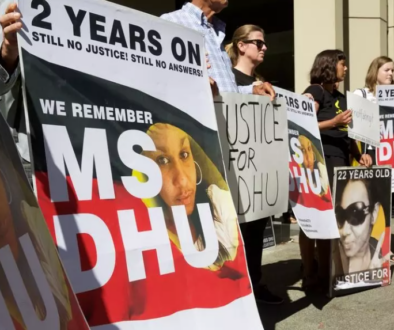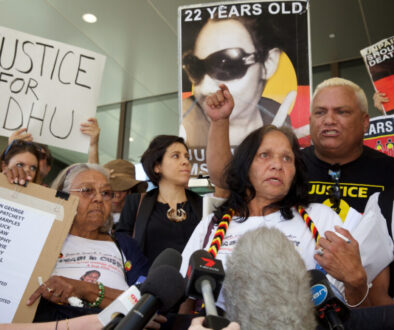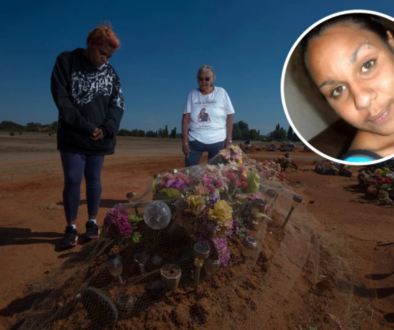Ms Dhu endured ‘inhumane treatment’ by police before death in custody – coroner
Key Points
- Coroner finds medical care for Indigenous WA woman was ‘deficient’
- ‘Profoundly disturbing’ CCTV footage of last hours to be released
The Indigenous woman Ms Dhu was subjected to “unprofessional and inhumane” treatment by Western Australian police that was “well below the standards that should ordinarily be expected” before her death in custody in 2014.
The coroner Ros Fogliani released CCTV footage of Dhu’s time in custody, save for a final scene that showed her very close to death at hospital. Fogliani said the footage was “profoundly disturbing”.
Her report recommended that Western Australia should end the practice of jailing people for unpaid fines and introduce a mandatory custody notification scheme in the wake of Dhu’s death.
Dhu’s death has become a symbol of the Aboriginal Lives Matter movement across Australia and has been raised by the Black Lives Matter movement in the US.
Speaking to a packed courtroom in Perth on Friday, Fogliani said Dhu’s medical care on her second presentation at hospital was “deficient” and that both police and hospital staff were influenced by preconceived notions about Aboriginal people.
Speaking through sobs to the media outside court before the findings were handed down, Dhu’s grandmother Carol Roe said it felt as though she had lost her granddaughter again, as it did every time the family attended the coroner’s court.
Later, flanked by the Noongar elder Uncle Ben Taylor, Roe said the footage needed to be released “to show the truth of what happened to my granddaughter”.
“Her birthday is in 10 days’ time,” she said. “We are supposed to celebrate Christmas but we can’t because there’s one missing in my family. I have to go to the cemetery, that’s my Christmas.”
Roe and her daughter, Ms Dhu’s mother Della Roe, said they were disappointed by the findings because “no one was held accountable”. Della Roe said she had come to court on Friday hoping for justice, but “I still haven’t got it.”
Dhu, a Yamatji woman whose full name is not used for cultural reasons, died in police custody in Port Hedland, 1,500km north of Perth, on 4 August 2014.
She had been picked up at 5pm on 2 August on a warrant of commitment for $3,622 in unpaid fines and was told she would have to spend four days in the lockup of the South Hedland police station to clear her debt.
About 8pm on the first night, Dhu complained of terrible pain in her chest and asked to go to hospital. CCTV footage of that night shows her sitting in the charge room with a young police officer for more than an hour, waiting for police to arrange an escort to take her to the nearby Hedland health campus. She is moaning and crying in pain and, when asked to rate her pain out of 10, says “10”.
The inquest learned that the pain was caused by an infection in the rib broken more than three months earlier in an altercation with her partner, Dion Ruffin, but that was not discovered until the autopsy.
Ruffin had been arrested alongside her in Hedland on charges of breaching a family violence order against a former partner, and was put in the neighbouring cell.
The emergency department doctor, Annie Lang, told the inquest she thought Dhu’s pain was real, though exaggerated, but wrote in her notes that it could be for “behavioural gain”. She gave Dhu endone, an opiate-level painkiller, and diazepam, and declared her fit for custody.
About 5pm the next night Dhu again asked to go to hospital, saying the pain was now all over her body.
The triage nurse, Alyce Heatherington, told the police escorting a handcuffed Dhu that “this could be withdrawal from drugs”. Dhu had told hospital staff she had taken half a point of methamphetamine – less than 0.1g – the day before her arrest.
Dr Vafa Naderi, who had seen Dhu come in the night before, performed an ultrasound to check her chest before discharging her with a paracetamol tablet and a certificate saying she was fit to be held in custody. His notes from that night say “behavioural issues” and “drugs?”.
The senior officer that day, Sergeant Rick Bond, had already told Dhu’s father, Robert Dhu, that she was “using” and attributed her symptoms to drug withdrawal.
When police returned Dhu from hospital, CCTV from the police station shows First Class Constable Callan George, the lockup keeper that evening, saying: “Paracetamol? Paracetamol, after all that?”
George told the inquest that after that point he believed Dhu was “faking” it. Dhu asked to go to hospital again on the morning of 4 August and soon afterwards reported that she had lost feeling in her legs and was unable to stand up. At 12pm the CCTV shows Senior Constable Shelly Burgess, who had been sent by Bond to offer Dhu a shower, entering her cell.
According to Burgess, Bond told her: “She has been to the hospital twice before, she is a junkie coming off drugs. She is faking now that she can’t get up, she was walking around this morning but now she is saying that she can’t get up, so can you go give her a shower, so when she is up moving around I can say to her, ‘See, you are full of shit.’”
The footage shows Burgess yank Dhu sharply into a sitting position and then drop her arm, causing her to fall back and hit her head on the concrete. Burgess told the inquest Dhu had slipped.
Burgess was issued an assistant commissioner’s warning notice after an internal police investigation for the “lack of urgency” she showed after Dhu hit her head, and 10 other officers were given disciplinary notices for failing to correctly follow lockup procedure. Most told the inquest they did not understand the notice and did not know why they had been disciplined.
At 12.30pm, Bond agreed to send Dhu to the hospital for a third time. She could not walk and the footage shows Constable Chris Matier walk into the cell, handcuff her hands in front of her, and then drag her out. In the hallway Burgess joined him by picking up Dhu’s feet and together they carried her out and loaded her into the back of the police van.
CCTV from the hospital shows them arrive and put Dhu in a wheelchair. Dhu’s head falls back when sitting up, her feet fall off the pedals and drag on the ground.
Matier and Burgess told the emergency department triage nurse that Dhu was “faking it”. The nurse replied that she had had a heart attack. Dhu was declared dead at 1.38pm after doctors spent 53 minutes trying to revive her.
Her uncle Shaun Harris said the family intended to pursue further legal action.
“We want all parties to be held accountable, be it the partner who started off all of this … and of course police and the health service,” he said. “They are all accountable.
“They were all supposed to have cared about [Dhu] and yet [she] is not here because all of these carers do not care.”
Dennis Eggington, the chief executive of the Aboriginal Legal Service of
WA, said the coroner’s recommendations were “fine” but had come too
late. “What we are angry about us that you are still killing our people,” he said. “We don’t want to stand here again.”
Western Australian police commissioner Karl O’Callaghan told reporters the images of Dhu’s treatment were disturbing.
“We do have some very basic obligations to the people who come into our care,” he said.
“From the moment they are in our custody, we are the guardians of their safety, their welfare and, of course, their dignity and I accept that we failed Ms Dhu in this regard.
“She was not treated with the right level of human compassion or dignity.”
Contact us
Please provide a brief description of your claim.



